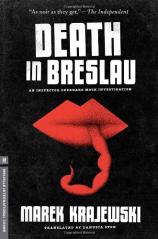Death in Breslau: An Eberhard Mock Investigation
Review
Death in Breslau: An Eberhard Mock Investigation
DEATH IN BRESLAU by Marek Krajewski (ably translated into English by Denusia Stok) was my introduction to Polish noir, and a fine introduction it was. This is the first of what is known as the Eberhard Mock Quartet, taking its name from the police inspector who performs a fine and dangerous balancing act between his own scruples and the sadistic interlopers who have invaded his country and insidiously taken control of its law enforcement. Though the narrative opens in 1950, it jumps back and forth in time, with the focus set primarily in the early 1930s, as the building blocks that would become World War II are being laid in place and the German Gestapo has begun to strengthen its hold upon Poland and especially upon Breslau, the largest city in the western part of that nation.
"Those unfamiliar with the times and places that serve as the backdrop for DEATH IN BRESLAU will likely find themselves swept up in the labyrinth of events that this dark and complex work presents, much like the characters themselves."
In the jittery, occupied Breslau of 1933, the fortunes and fates of many professional careers dip and swirl around a brothel that provides as many variations of entertainment of which one might conceive. It is on one particular night that Inspector Mock, a regular patron of the establishment, is being entertained in the manner to which he has become accustomed during an extremely unique chess game. The evening’s merriment is interrupted when he is summoned to a railroad car on the Breslau-Berlin line. What he finds is the aftermath of a bizarre and horrific crime; the victims include the daughter of Baron Olivier von der Malten and her governess. The bizarre nature of the crime --- one that threatens to turn the reader’s brain inside-out --- is further accentuated by the presence on the car wall of some cryptic writing, apparently in the blood of the victims.
Mock’s investigation is superseded by the Gestapo, who blame the murders on Friedlander, an epileptic Jewish merchant who is almost certainly innocent. Mock is given the choice of going along with the Gestapo’s conclusion and being promoted to Criminal Director of the Police Praesidium, or continuing his own investigation and facing the consequences. He takes the path of least resistance, with some misgivings. But after the unfortunate defendant commits suicide under questionable circumstances, Mock receives a suspicious package, the contents of which indicate that the real killer is still at large. Mock, whose association with the Baron is tied to their membership in the Freemasons, feels obligated to quietly reopen the investigation. He recruits a young policeman named Herbert Anwaldt to assist him in this undertaking. Anwaldt is dedicated and focused; he is also a hardcore alcoholic who is motivated toward sobriety, though that is not always quite enough.
Mock often finds himself at cross-purposes with the Gestapo, who suspect his intentions, while at the same time his own Freemasonry ties get him caught up with that organization’s intrigues. Ultimately, no one who comes into this book comes out on the other end entirely intact, let alone standing; sometimes breaking even, or breaking at all, is triumph enough.
DEATH IN BRESLAU is character- and event-driven, where each and every action has the potential to cause a fatal reaction, and navigation through the cultural and political waters is fraught with danger. There are several vignettes reminiscent of those contained in NAKED LUNCH by William Burroughs and, alternatively, in Jerzy Kosinski’s A PAINTED BIRD; further cautions are presumably not necessary. Those unfamiliar with the times and places that serve as the backdrop for DEATH IN BRESLAU will likely find themselves swept up in the labyrinth of events that this dark and complex work presents, much like the characters themselves.
Reviewed by Joe Hartlaub on November 9, 2012
Death in Breslau: An Eberhard Mock Investigation
- Publication Date: September 4, 2012
- Genres: Fiction, Historical Fiction, Historical Thriller, Suspense, Thriller
- Hardcover: 256 pages
- Publisher: Melville International Crime
- ISBN-10: 1612191649
- ISBN-13: 9781612191645





